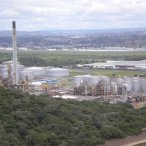English · Español

7 December 2011 | Videos | Resisting neoliberalism | Human rights | Climate Justice and Energy | COP 17
An Unforgettable Tour
What is concealed at the COP: The oil industry and its criminal practices in the south of Durban
Download: MP3 (6.7 Mb)
Giant oil transnational corporations like Shell and BP (which are both part of the SAPREF consortium) and others such as Malaysian company Engen, are causing havoc in the South Durban industrial basin. The reports reached as far as The Hague, Netherlands.
In an area that could be paradise, with hills and magnificent beaches and a great natural landscape, the oil industry is leaving its footprint and it is disturbing the life of local communities. Also factories from other sectors like the paper industry end up creating a polluting cocktail.
In this geographical point overlooking the ocean and the endless oil infrastructure, Real World Radio interviewed social leader Bongani Mthembu at the “View Point” where one can see the “Beauty and the Beast”.
Mthembu is part of the South Durban Community Environmental Alliance, an organization founded in 1995 to work on environmental justice and human rights for the communities of the area. The activist was the guide of the “Toxic Tour” along the South of Durban, where Real World Radio participated. The tour even had the intimidating element that big corporations sometimes like to use such as persecution, filming and taking photographs to the people from different parts of the world who were traveling in the van.
The population of the south of Durban, mostly low income workers, trust in the work of the South Durban Community Environmental Alliance. The group leads the fight against industrial pollution in the area.
A clear culprit
On October 10 of the year the explosion of a fuel tank of Engen corporation affected the area. The black smoke that invaded the area stained the clothes of teachers and students of the Settlers Primary High School, close to the Malayan corporation’s plant. The outcome? Children and teachers were hospitalized.
The company did not even send an email to apologize for the incident. The community of the are protested. The companies “They want hundred per cent or two hundred per cent production so they put profits before people and for us that is unacceptable”, said Laurence Vartharajulu, responsible for the environment area of the Settlers Primary High School.
In an interview at the study center as part of the “Toxic Tour” Vartharajulu, who works as a volunteer, said that companies like Engen and SAPREF have “violated our children’s right to breathe a clear and pure air” and that “”they should be reported to the Human Rights Commission”.
He also added that these companies invest small amounts of money to the study center as part of their “social responsibility” work, which he considers an obligation because of the pollution they have brought the local population.
Vartharajulu also highlighted the high incidence of cancer in the community and that there are clear links between the industrial operations in the area with the diseases suffered by the people. He stated that the teachers start to get sick when they start working there.
In November last year, Mthembu went to The Hague to meet with representatives from the Dutch government to speak about Shell’s operations, a company notorious for their degradation in Nigeria, in the Niger Delta region. “They should be taking care of their industries in the developing countries”, said the activist to Real World Radio with reference to the Dutch authorities, and he shared some of the answers he received. "They said: “We understand your position, you come from the civil society, but in most cases when your government comes to us is saying a different story, inviting us to come in and invest more in your country, and your government is not actually enforcing legislation to us”, said Mthembu, trusting their honesty. “So we cannot come with our own legislation and implement it in your country”, the authorities added, according to Mthembu.
However, these answers were far from satisfying the representative of the South Durban Community Environmental Alliance, who rejected the lack of responsibility of a government that does not control the work of its national companies in other countries. Close to the end of the interview, Mthembu regretted the "arrogance" of companies that claim to be “good neighbors”.
Photo: Radio Mundo Real







